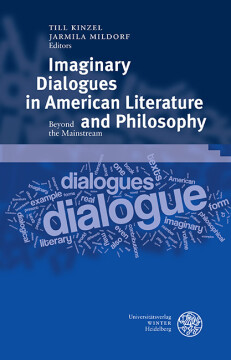
BUCH
Imaginary Dialogues in American Literature and Philosophy
Beyond the Mainstream
Herausgeber: Kinzel, Till | Mildorf, Jarmila
Germanisch-Romanische Monatsschrift. Beihefte, Bd. 62
2014
Zusätzliche Informationen
Bibliografische Daten
Abstract
This book provides a first overview and interdisciplinary discussion of imaginary dialogues in American literature and philosophy from the eighteenth century to the present. It combines the perspectives of literary studies, philosophy, linguistics and political history to offer wide-ranging analyses of 19th-century anti-slavery dialogues and the dialogical writings of Thomas Paine, Benjamin Franklin, Charles Brockden Brown, Washington Irving, Edgar Allan Poe, Henry David Thoreau, Herman Melville, Henry James, William James, Charles Sanders Peirce, George Santayana, Gertrude Stein, Jerome McGann, Leon Forrest, Paul Feyerabend, Corey Mesler, Nicholson Baker and Cormac McCarthy. Taking a fresh look at these American writers the essays in this volume explore the important yet marginalized tradition of dialogical writing and highlight the transatlantic nature of many American dialogues.
Inhaltsverzeichnis
| Zwischenüberschrift | Seite | Aktion | Preis |
|---|---|---|---|
| Preface | 5 | ||
| Table of Contents | 7 | ||
| Till Kinzel and Jarmila Mildorf, Mapping Imaginary Dialogues in America | 9 | ||
| Jack Fruchtman Jr., The American Dialogues of Thomas Paine | 27 | ||
| Kurt Müller, Dialogue and Dialogic Structures in Benjamin Franklin’s Writings | 39 | ||
| Nicole Maruo-Schröder, “It is not for me to smile at their tyranny”: Democracy and Dialogue in Charles Brockden Brown’s Alcuin | 67 | ||
| Virgil Nemoianu, Washington Irving’s Dialogical Bridges | 91 | ||
| Betsy van Schlun, Conversing with the Netherworld: The Gothic Dialogue about Metaphysical Matters and Universal Thought in E. A. Poe’s “Mesmeric Revelation” | 101 | ||
| Joe Lockard, Antislavery Dialogues in the United States | 113 | ||
| Antonio Lastra, From Walden to Waldwasen: Dialogues between Hermits and Poets (Thoreau, Heidegger, Celan) | 133 | ||
| David Janssens, Melville’s Song and Dance: Diabolical Dialogue in The Confidence-Man: His Masquerade | 147 | ||
| Hans Ulrich Seeber, Stereotypes, Utopian Vision and the Creation of the Illusion of Life. An Analysis of Henry James’s “Daniel Deronda: A Conversation” (1876) | 169 | ||
| Vincent Colapietro, C. S. Peirce and Dialogue: Literary Form, Heuristic Function, and Overarching Ideal | 189 | ||
| Miriam Strube, In the end was … “A Dialogue”: William James’s Performing Pragmatism | 211 | ||
| Krzysztof Piotr Skowroński, George Santayana’s Dialogues in Limbo (1925) as a Form of Literary Philosophy | 227 | ||
| Christoph Schubert, Dialogue of Dissent: Stance Marking in Gertrude Stein’s Radio Interview (1934) | 243 | ||
| Till Kinzel, Literary Criticism as Dialogue: From Jerome McGann’s Dialogical Confrontation with Swinburne to Meta-Dialogue | 259 | ||
| Thomas Sukopp, From Philosophy in Dialogues to Philosophy of Dialogues: Rethinking Paul K. Feyerabend’s Three Dialogues on Knowledge | 269 | ||
| Walter Göbel, Performing Dialogues in Leon Forrest’s Divine Days | 289 | ||
| Jarmila Mildorf, Exploring “our pitiful attempts at connection”: Dialogue in Corey Mesler’s Novel Talk | 301 | ||
| Sabrina Hüttner, “You and I sat here talking the pros and cons of–of–”: Immediacy, Conspiracy, and the Dialogic Mode in Nicholson Baker’s Checkpoint | 315 | ||
| Markus Wierschem, “It’s more true but it aint as good: ” Searching for Truth in the Death-Deferring Dialogue of McCarthy’s The Sunset Limited | 327 | ||
| Notes on Contributors | 349 | ||
| Index | 353 |


 Publishing Platform by CloudPublish
Publishing Platform by CloudPublish